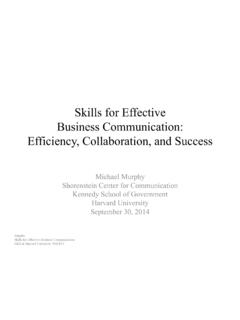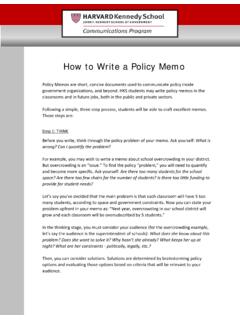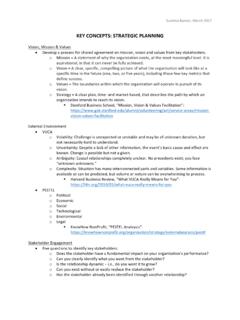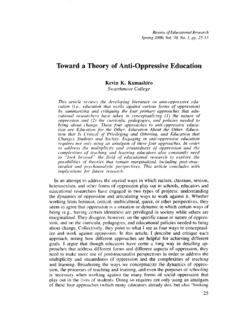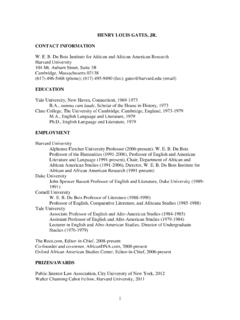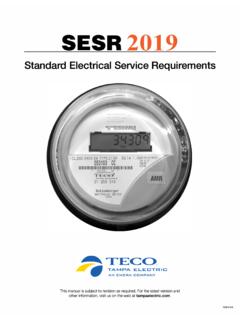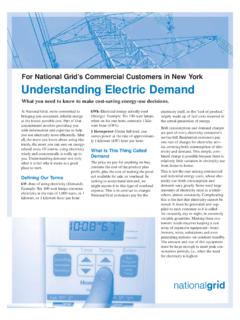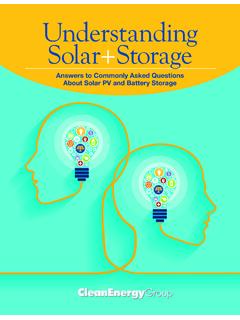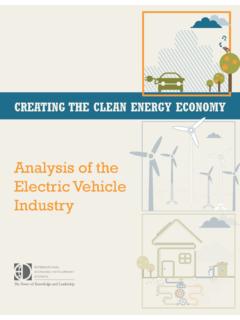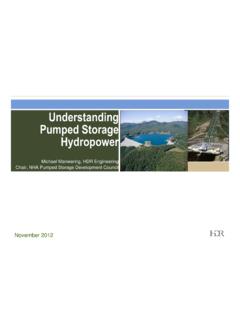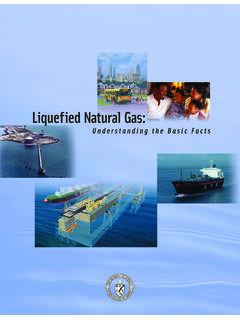Transcription of Charging the Future: Challenges and Opportunities for ...
1 Charging the Future: Challenges and Opportunities for Electric Vehicle Adoption Faculty Research Working Paper Series Henry Lee Harvard Kennedy School Alex Clark Climate Policy Initiative September 2018 RWP18-0 26 Visit the HKS Faculty Research Working Paper Series at: The views expressed in the HKS Faculty Research Working Paper Series are those of the author(s) and do not necessarily reflect those of the John F. Kennedy School of Government or of Harvard University. Faculty Research Working Papers have not undergone formal review and approval.
2 Such papers are included in this series to elicit feedback and to encourage debate on important public policy Challenges . Copyright belongs to the author(s). Papers may be downloaded for personal use only. PAPERAUGUST 2018 ENVIRONMENT AND NATURAL RESOURCESC harging the FutureChallenges and Opportunities for Electric Vehicle AdoptionHenry LeeAlex ClarkEnvironment and Natural Resources Program Belfer Center for Science and International Affairs Harvard Kennedy School 79 JFK Street Cambridge, MA authors of this report invites use of this information for educational purposes, requiring only that the reproduced material clearly cite the full source: Lee, Henry, and Alex Clark, Charging the Future.
3 Challenges and Opportunities for Electric Vehicle Adoption. Belfer Center for Science and International Affairs, Cambridge, Mass: Harvard University, August and views expressed in this report are solely those of the authors and do not imply endorsement by Harvard University, the Harvard Kennedy School, or the Belfer Center for Science and International and layout by Andrew FaciniCover photo: A Tesla Model 3 charges using a Mobile Charger , 29 July 2017. (Steve Jurvetson/CC BY )Copyright 2018, President and Fellows of Harvard College Printed in the United States of AmericaENVIRONMENT AND NATURAL RESOURCESPAPERAUGUST 2018 Charging the FutureChallenges and Opportunities for Electric Vehicle AdoptionHenry LeeAlex ClarkiiCharging the Future.
4 Challenges and Opportunities for Electric Vehicle AdoptionAbout the ProjectThe Environment and Natural Resources Program at the Belfer Center for Science and International Affairs is at the center of the Harvard Kennedy School s research and outreach on public policy that affects global environ-ment quality and natural resource management. Its mandate is to conduct policy-relevant research at the regional, national, international, and global level, and through its outreach initiatives to make its products available to decision-makers, scholars, and interested information can be found on ENRP s web site at or from assistant director, Amanda Sardonis at ENRP, Harvard Kennedy School, 79 JFK Street, Cam-bridge, MA 02138 Center for Science and International Afiairs | Harvard Kennedy SchoolAbout the AuthorsHenry Lee is the Jassim M.
5 Jaidah Family Director of the Environment and Natural Resources Program within the Belfer Center for Science and International Affairs at Harvard s John F. Kennedy School of Government, Faculty Co-Chair of the Sustainability Science Program, and a Senior Lec-turer in Public Policy. He also serves on the board of the school s Middle East Initiative. Before joining the School in 1979, Mr. Lee spent nine years in Massachusetts state government as Director of the State s Energy Office and Special Assistant to the Governor for environmental policy. He has served on numerous state, federal, and private boards, and advisory com-mittees on both energy and environmental issues.
6 His recent research interests focus on energy and transportation, China s energy policy, and public infrastructure projects in developing countries. Alex Clark is a climate finance analyst at the Climate Policy Initiative, cov-ering a range of topics including low-carbon transport, blended finance and tracking of climate finance flows. He is Senior Advisor to the Sustain-able Development Solutions Network - Youth, and was the 2016-17 Henry Fellow at the Harvard Graduate School of Arts and Sciences. He hold an MSc in Global Governance and Diplomacy from Oxford University, and a BA(Hons) in Politics, Philosophy and Economics from the University of Warwick.
7 Alex provides informal coordination support to the Galvanizing the Groundswell of Climate Actions initiative, supporting non-state and subnational climate action efforts globally. He is also an Associate Fellow of the Royal Commonwealth Center for Science and International Afiairs | Harvard Kennedy SchoolAcknowledgementsThis paper benefited from the assistance on data access and analysis from William Hogan, Raymond Plank Professor of Global Energy Policy at the Harvard Kennedy School, and Mauricio Salles, Laboratory of Advanced Electric Grids - LGrid, Polytechnic School, University of S o Paulo, S o Paulo 05508-010, Brazil, and from data collected by PlugShare (formerly Recargo).
8 The authors are particularly thankful to the following individuals for their insights and contributions: Will Carry New York City Department of TransportationAbdellah Cherkaoui Vo l t aLarry Dickerman Landis+GyrRyan Harty American Honda Motor CompanyPaul Hibbard Analysis GroupSteve Kosowski Kia Motors AmericaNick Lembach RecargoKevin Miller ChargePointSalim Morsy Bloomberg New Energy FinanceMike Nicholas International Council on Clean TransportationTerry O Day EVGoParina Parikh San Diego Gas & ElectricQinyu Qiao Harvard Kennedy SchoolJonathan Raab Raab AssociatesMichael Replogle New York City Department of
9 TransportationRobert Scholer Kia Motors AmericaCal Silcox Pacific Gas & Electric Mark Simon New York City Department of TransportationPatrick Smith New York City Department of TransportationD e a n Ta y l o r Southern California EdisonNone of the individuals listed have any responsibility for the content of this paper, nor do they necessarily endorse its findings. We would also like to express our appreciation to Julie Gardella for her assistance in formatting and preparing numerous drafts of this paper. viiBelfer Center for Science and International Afiairs | Harvard Kennedy SchoolTable of ContentsExecutive Summary.
10 1 Introduction ..41. Battery Technology .. Challenges to Wider Deployment .. Subsidies .. Lifetime Costs ..112. Charging Infrastructure .. The Charging Challenge .. Types of EV Charging Equipment .. Understanding Charging Economics .. Fixed Costs .. Variable Energy Costs .. Modeling Charging Economics .. Results of the Analysis .. Commercial Charging .. Pricing models .. Summary .. Load Management for Large-Scale EV Integration ..483. Conclusion ..524. References ..54 Appendices .. Lifetime EV Cost Modeling .. Charging Infrastructure Base Case Model Assumptions.

